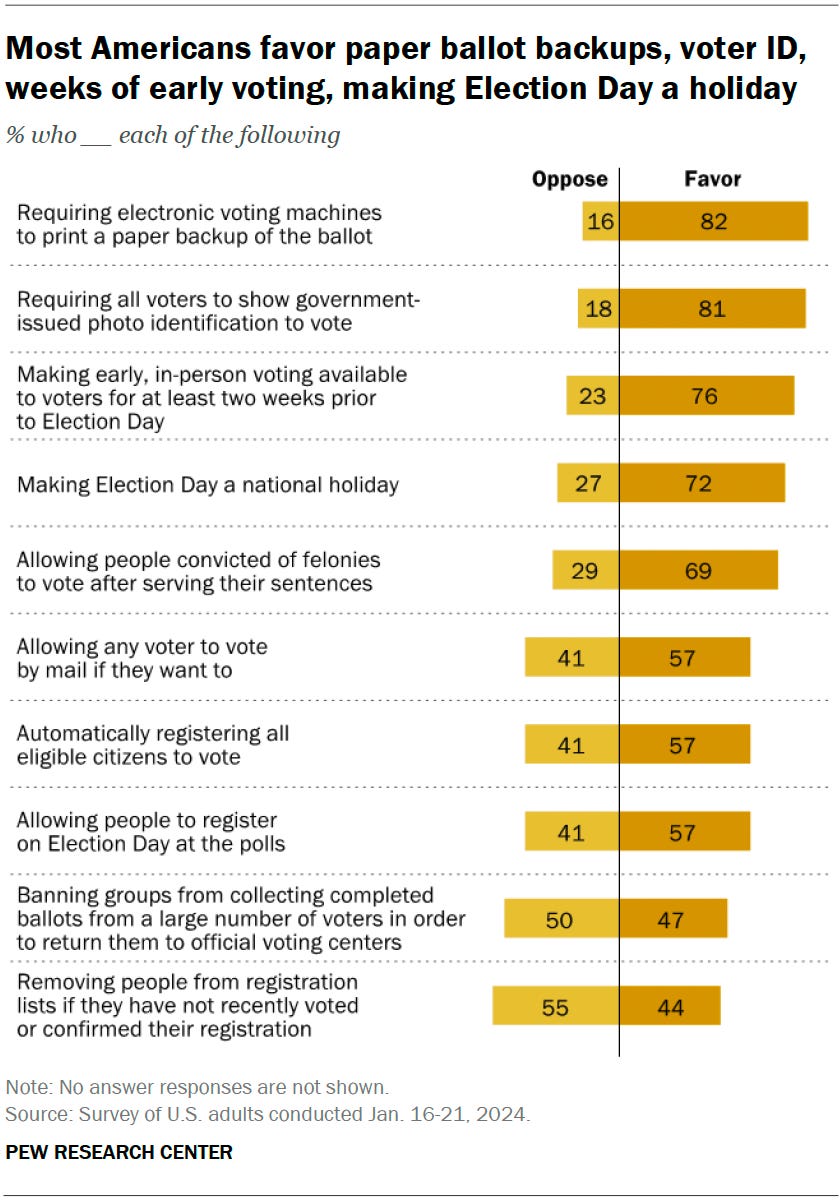The 23 Election Reforms That Everyone Can Get Behind – BCB #91
When it comes to how to vote, Red and Blue are in closer alignment than you might think
A national grass-roots research project reveals that both Red and Blue are enthusiastic about rehabilitating our electoral processes—and they can even agree on how to get there. As it turns out, restricting gerrymandering, verifying voters’ identities, and guaranteeing that politicians respect election results are all more universal concerns than one might think.
The report was created by the bridge-building group Braver Angels, which seeks to “create common ground solutions to some of America’s most pressing political problems.” From 2020 to 2023 facilitators hosted local gatherings across the nation, evenly balanced between Red and Blue participants, for in-depth conversations. Braver Angels chose not to focus on assigning blame for the damage to public trust in the electoral process, and instead canvassed practical proposals for how to rebuild that trust.
Across 26 workshops, Braver Angels found an astonishing 727 unanimous points of agreement. They then distilled those points into three core principles for policy change:
“Every citizen should have an equal say in who will govern them; this is done through free and fair elections.”
“The American government will fail if candidates refuse to accept any outcome other than victory.”
“Voting should be easy. Cheating should be hard.”
It’s easy to support generalities like this, but these discussions also showed that Red and Blue were able to agree on much more specific policies. For example, there was surprising consensus on the issue of voter ID. The cross-party groups agreed that ID checks should be required at polling booths—and that states should be required to actively provide valid ID for free, ensuring that security does not come at the cost of denying people their right to vote.
This is a particularly interesting political compromise, given that each side sees the other’s fears as overblown (there is very little voter fraud, and the effect of voter ID laws on turnout is inconclusive).
There was also broad support for making the day of the federal election a public holiday, for curtailing politicians’ ability to gerrymander and redistrict their voting bases, for requiring candidates to pledge to honor their election results, and for expanding access to absentee ballots.
The report includes 23 specific policy proposals like these, each of which garnered broad cross-partisan support, including:
All states should implement no-excuse needed absentee ballots.
Training for all poll watchers should be required. Engaging poll watchers from multiple parties should be encouraged but not required.
States should appoint independent commissions to form voting districts. The commissions should not include currently elected officials.
All votes that are cast using machines should also have a paper record.
Standard statewide chain of custody procedures should be implemented and should encompass the entire process, starting at the polling place and continuing through the handling and counting of ballots
States should conduct a systemic review and evaluation of the processes of unsolicited mail-in ballots to prevent fraud and irregularities.
States should join a shared database of voters, such as the existing Electronic Registration Information Center (ERIC), to improve the accuracy of voter rolls and eliminate dual voters.
This last proposal is particularly interesting since a number of Republican-controlled states abandoned ERIC after the 2020 election—but it’s such a good idea that they are now trying to replace it with something similar.
This level of consensus might seem too good to be true, but it isn’t just a one-off. A recent Pew study confirmed that while Red and Blue disagree about what threatens democracy, most agree that steps need to be taken to ensure that elections are fairer, and there’s cross-party support for many of those specific steps.

This data also shows bipartisan support for ID checks and for making election day a federal holiday. Perhaps most remarkably, 69% agreed that felons who have served their sentence should have the right to vote.
It turns out that Americans of all backgrounds are prepared to work together to build a democracy they can believe in. This is an essential insight, especially in an election season where faith in the American democratic process is at a historic low. A majority of Republican voters believe the 2020 election was stolen from Donald Trump, despite clear evidence to the contrary. Meanwhile, 84% of Democrats believe that the January 6th attacks on the Capitol were a deliberate attempt to overthrow the government. Neither side seems to trust the other to act in good faith.
The perception of good faith is essential to the democratic process. Without it, more and more voters will simply refuse to participate, out of a belief that their vote “does not matter.” Both sides will start to believe, rightly or wrongly, that the other seeks to undermine the electoral process for its own ends. But this report shows that everyone wants fairer, more trustworthy elections for everyone, including those with whom they disagree. Red and Blue are prepared to back practical policy changes that make voting easier and strengthen electoral accountability in the long run, regardless of whether their own side will immediately benefit.
Quote of the Week
If civility demands so much of us, then the logical next question is: is it worth it? I think the answer is a resounding yes. When it comes to enacting political change, civility is a potent weapon.


